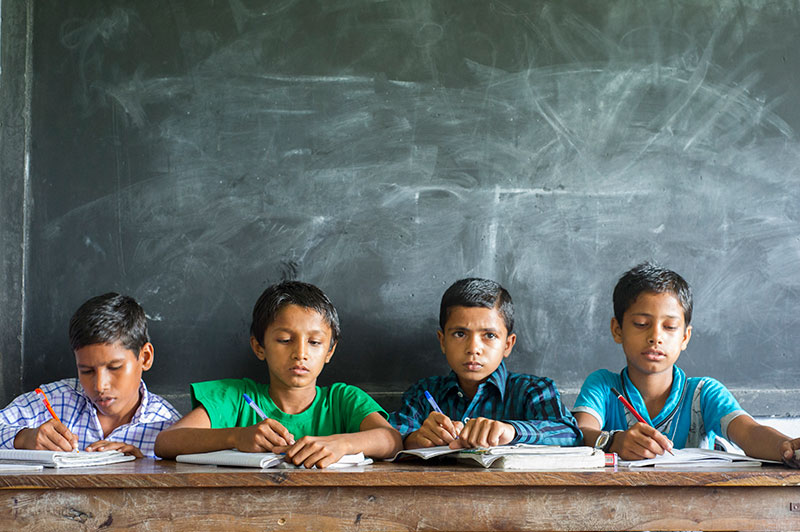
Groupies are an odd lot. They have an almost fanatical, unyielding and uncritical loyalty to someone (usually a musical group). They even follow them around in hopes of making contact. For the most part, it’s a very one-sided affair.
Therefore, it is with some hesitation and chagrin that I confess I AM A GROUPIE. I have been for quite some time now—basically since I was halfway into my PhD program at Michigan State University back in the mid-1980s.
The educational reformer whose work I found particularly enlightening was Richard Elmore: researcher extraordinaire; thinker; reformer; hope giver.
I was invigorated by his approaches and constructs to address some of the things I felt were horrific injustices in educational systems, and I blossomed through exposure to a professional body of knowledge that gave words to my own feelings and experiences built on nearly a decade of work in the bush of what was then Zaire.
A Brilliant Map
I found his theory of Backward Mapping brilliant: He argued that to change learning for students (who he placed in his model in the centermost of a series of concentric circles), you must envision the desired impact on them, and then analyze what must happen at each surrounding level from the classroom outward to the community, and eventually all the way out to national policymakers.
It was such a simple construct and so useful in helping people—particularly change-wary decision makers—navigate the thorny dynamics of institutional change.
Over the years, Elmore’s thinking evolved and I looked forward to each new publication, always asking myself how I could apply it to my work with Education Ministries in countries that often struggled with a host of constraints ranging from limited funds, poorly educated teachers, parents who devalue education, and—even worse—corruption and armed conflict.
I always clung to Elmore’s work and used that as a guide when carrying out my own.
So imagine my horror when I heard my mentor speaking on a 2012 C-SPAN panel boldly charging that what we’ve been doing for decades isn’t working.
“I do not believe in the institutional structure of public schooling anymore,” he said heavily. “I view the work that I continue to do with schools…as palliative care for a dying institution.”
Elmore said he was giving up on Backward Mapping, and even more shocking, the very idea that it was possible to improve learning by restructuring schools and educational systems.
Then, the absolute kicker: If we want to learn how to prepare students in the west for the future, Elmore said on the show, we need to look to practices being implemented in developing countries to find the answers.
Restructuring won’t work? Give up on the educational system as we know it? It was like a shock wave went through me. Elmore was saying we had all failed.
And I couldn’t really disagree. At approximately 6.5 percent, the school dropout rate in the U.S. more than substantiates his statement.
No Schools, No Teachers?
Elmore then spoke of several innovations using totally new approaches to foster learning. Instead of pushing children into education that does not serve their real needs or interests, these locally-developed innovations pull children into a learning environment where they want to be.
They explore possibilities through questioning rather than being force-fed “stuff” that too often is irrelevant to the growing and often threatening demands in their lives. Things like gangs, Ebola, terrorism, hunger.
One example of this approach is the Learning Community Project underway in Mexico, where youth embark on individual inquiry under the guidance of trained adult mentors, then tutor others on the knowledge they have mastered.
No schools. No teachers. No hierarchies.
As of 2012, children learning through this model were surpassing the national averages on test scores.
What does this mean for my work today, as I continue to collaborate with education officials in countries that still look to the U.S. for support when it comes to boosting learning outcomes?
At the moment I have more questions than epiphanies, but two things are clear: First of all, we need to figure out how to use teachers as facilitators of learning and not as holders of knowledge who pour facts, figures and information into students’ heads.
Secondly, we need to rethink what a curriculum should be, and determine what core knowledge students need to navigate life—especially in the early grades when the foundation for all future learning takes place.
Although I believe the movement to focus on literacy and numeracy in the early grades is undoubtedly a step in the right direction, it just might prove impossible to achieve the Education for All and Millennium Development Goals (and reach millions of children who today have limited access to quality learning opportunities) if we cling to the familiar concept of “school.”
If we maintain the traditional construct that educating children means they go to a building called a “school” in which there is a classroom and a teacher who presents information to pupils for a set amount of time, we will likely continue to fail.
So, the one thing I am convinced of is that as shocking as I initially found his provocations, Elmore and others in his camp are right. Although it is a politically charged and daunting task, we need to rethink how schooling and educational systems are structured.
Am I still Richard Elmore’s groupie? Indeed I am. I am faithfully following him along on his journey as he contemplates a new construct of how to “learn” instead of teach children, and how to prepare them for an ever changing world.